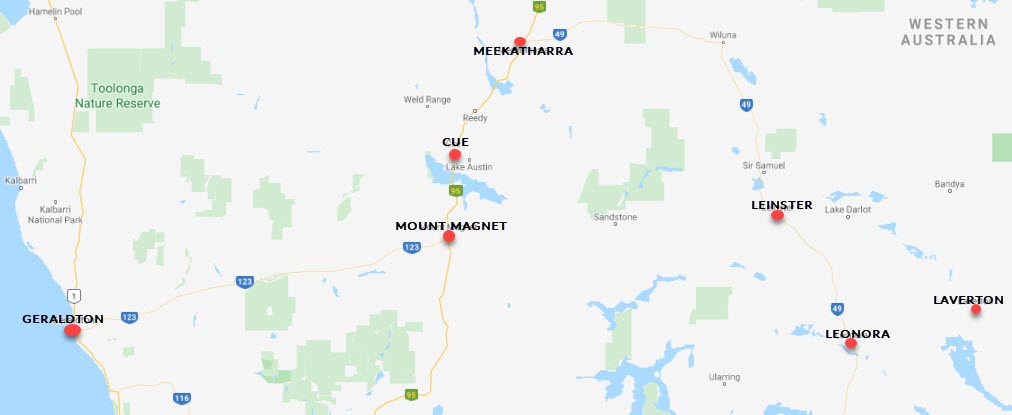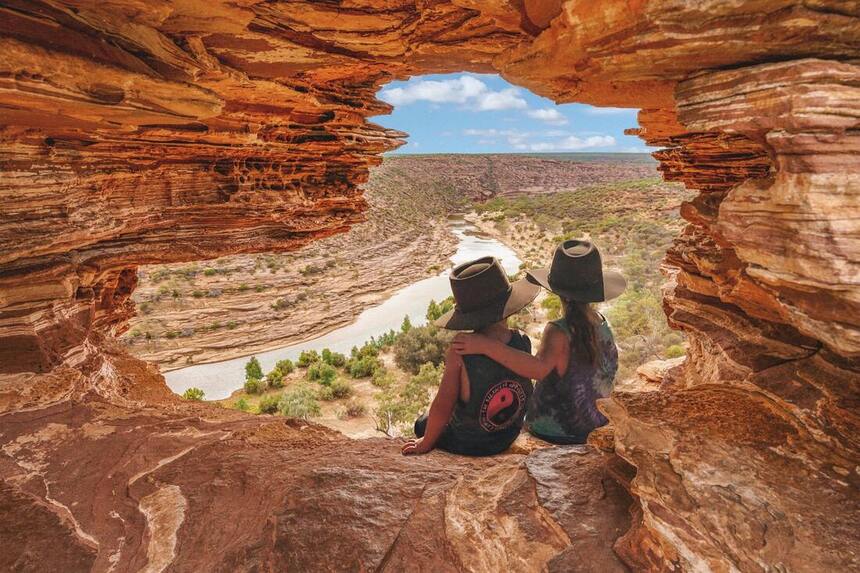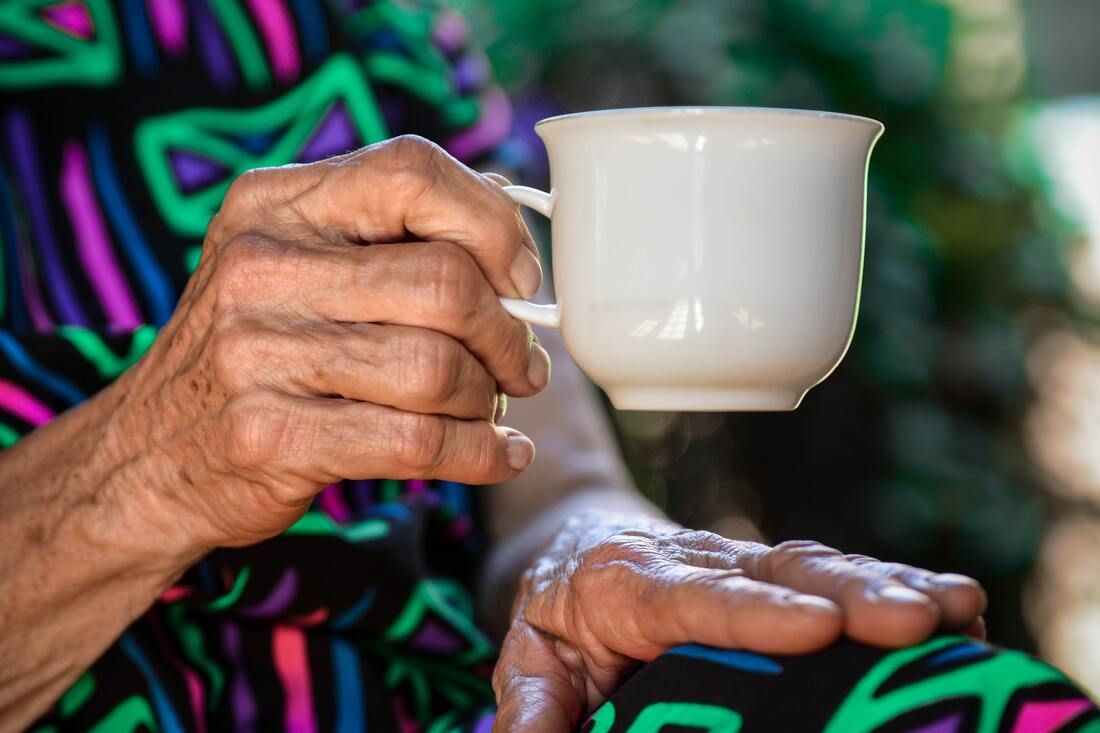BACKGROUND
In recent months, many of us have experienced for the first time what it is like to attend liturgy with only a few other people. The churches have seemed almost empty, and we have longed for a time when we can gather in large numbers again with the entire community. However, for those living in remote areas of our vast country, it is the norm to celebrate Sunday liturgy with small groups of up to ten people. Sr Gerri Boylan writes of her ministry in the parish of Mt Magnet, Western Australia.
Mt Magnet is almost four hours drive west of Geraldton. The parish includes the towns of Cue (an hour to the north) and Meekatharra (over another hour further north). On the third Sunday of the month, a priest from Geraldton undertakes an 1100 km round trip to celebrate Mass in each town. In between, Sr Gerri organises the Liturgy of the Word with Communion. The attendance is between 1 and 6 people at Meekatharra, 1 and 3 at Cue, and between 5 and 15 people at Mt Magnet. These are small mining towns: Meekatharra with a population of 700, Mt Magnet about 500 and Cue less than 200. Aboriginal people make up about 35% of the residents in Meekatharra and about 20% in the other centres. Sr Gerri casually mentions the towns of Laverton, Leonora and Leinster. This is the neighbouring parish, further to the west. It now has no priest or pastoral associate. Laverton (pop. 340) is seven hours west of Mt Magnet with stops at Leinster (pop. 730) and Leonora (pop. 550) on the way. On the fourth Sunday of the month a priest drives out from Geraldton to offer Mass in each town, a round trip of 1800 km and 22 hours of driving.
BACKGROUND
In recent months, many of us have experienced for the first time what it is like to attend liturgy with only a few other people. The churches have seemed almost empty, and we have longed for a time when we can gather in large numbers again with the entire community. However, for those living in remote areas of our vast country, it is the norm to celebrate Sunday liturgy with small groups of up to ten people. Sr Gerri Boylan writes of her ministry in the parish of Mt Magnet, Western Australia.
Mt Magnet is almost four hours drive west of Geraldton. The parish includes the towns of Cue (an hour to the north) and Meekatharra (over another hour further north). On the third Sunday of the month, a priest from Geraldton undertakes an 1100 km round trip to celebrate Mass in each town. In between, Sr Gerri organises the Liturgy of the Word with Communion. The attendance is between 1 and 6 people at Meekatharra, 1 and 3 at Cue, and between 5 and 15 people at Mt Magnet. These are small mining towns: Meekatharra with a population of 700, Mt Magnet about 500 and Cue less than 200. Aboriginal people make up about 35% of the residents in Meekatharra and about 20% in the other centres. Sr Gerri casually mentions the towns of Laverton, Leonora and Leinster. This is the neighbouring parish, further to the west. It now has no priest or pastoral associate. Laverton (pop. 340) is seven hours west of Mt Magnet with stops at Leinster (pop. 730) and Leonora (pop. 550) on the way. On the fourth Sunday of the month a priest drives out from Geraldton to offer Mass in each town, a round trip of 1800 km and 22 hours of driving.
The Middle of Nowhere
by Gerri Boylan SGS
It doesn’t happen often at a liturgy that someone turns around to others in the church and tells (orders?) them quite audibly to put at least $5 on the collection plate. But that is exactly what happened on 9 September when our oldest and slightly-deaf parishioner was celebrating her 90th birthday.
She was surrounded by visitors -- her aged siblings and children who had travelled hundreds of kilometres to be with her for this grand occasion. It was these people to whom she directed her words. We laughed because the order was so unexpected on one hand, but on the other, not the least bit surprising given this lady’s forthrightness and pride, her participation in and fidelity to our weekly liturgy. She pulls her weight in tidying the church at the end of each Sunday liturgy: she wheels the bowl of holy water on the seat of her walker to the place where it is stored until the following Sunday. Contributing to the collection is part-and-parcel of being present at our liturgy according to our elderly friend.
For over thirty years, the Sisters of the Good Samaritan lived in a community of 3-4 sisters mainly in Mt Magnet in the Geraldton diocese and ministered in a vast outback area covering the parishes and mining towns of Mt Magnet, Cue, Meekatharra, Laverton, Leonora and Leinster. Over that time noticeable changes occurred: the Celebration of the Eucharist has been reduced to once a month in each place, the Good Samaritan community is now one single sister, and the town populations have dwindled because of better opportunities for school or work elsewhere and the fly in/fly out program of the mining companies.
She was surrounded by visitors -- her aged siblings and children who had travelled hundreds of kilometres to be with her for this grand occasion. It was these people to whom she directed her words. We laughed because the order was so unexpected on one hand, but on the other, not the least bit surprising given this lady’s forthrightness and pride, her participation in and fidelity to our weekly liturgy. She pulls her weight in tidying the church at the end of each Sunday liturgy: she wheels the bowl of holy water on the seat of her walker to the place where it is stored until the following Sunday. Contributing to the collection is part-and-parcel of being present at our liturgy according to our elderly friend.
For over thirty years, the Sisters of the Good Samaritan lived in a community of 3-4 sisters mainly in Mt Magnet in the Geraldton diocese and ministered in a vast outback area covering the parishes and mining towns of Mt Magnet, Cue, Meekatharra, Laverton, Leonora and Leinster. Over that time noticeable changes occurred: the Celebration of the Eucharist has been reduced to once a month in each place, the Good Samaritan community is now one single sister, and the town populations have dwindled because of better opportunities for school or work elsewhere and the fly in/fly out program of the mining companies.
I have lived and worked in the parish of Mt Magnet for nineteen years as pastoral leader and administrator. There is a monthly Eucharist presided over by a priest from Geraldton. Meekatharra and Cue have a Sunday Celebration of the Word with Communion on one other weekend in the month and Mt Magnet has this celebration on all other weekends.
Acknowledgement of country situates our congregation in a particular place. But we are aware that our Celebration of the Word with Communion links us to the previous Eucharist celebrated in the church when bread ‘was consecrated for us today’. And in turn, we recognise in the Eucharist that we are joined to all God’s people throughout the world who, like us, celebrate the Mass and receive the out-pouring of God’s Spirit. In Mt Magnet, we are reminded each week that we gather as a community of the baptised, we pray as one, and we leave to continue Christ’s mission on earth. The generous spirit of small towns spills over into every gathering, and so our Sunday assembly is a significant and meaningful experience of ‘small is beautiful’.
Acknowledgement of country situates our congregation in a particular place. But we are aware that our Celebration of the Word with Communion links us to the previous Eucharist celebrated in the church when bread ‘was consecrated for us today’. And in turn, we recognise in the Eucharist that we are joined to all God’s people throughout the world who, like us, celebrate the Mass and receive the out-pouring of God’s Spirit. In Mt Magnet, we are reminded each week that we gather as a community of the baptised, we pray as one, and we leave to continue Christ’s mission on earth. The generous spirit of small towns spills over into every gathering, and so our Sunday assembly is a significant and meaningful experience of ‘small is beautiful’.
Even though there are only a few of us, the liturgical ministries are divided amongst those who have gathered so that all are given the opportunity to participate actively, physically and from the heart. This is most evident after the two or three texts of scripture are proclaimed. There is a profound silence that allows and induces a pondering on the Word.
This is how we break open God’s word as a community. Out of the silence, whoever wants to share a word or phrase from the readings does so while we all listen. If anyone wishes to make a relevant comment on what they have shared, they do so. The leader, who recognises the fundamental importance of knowing the congregation and their stories, then speaks the reflection she has prepared (for no more than seven minutes). Knowing the people permits the leader’s words to be real as the congregation is offered comfort and challenge. More silence follows. The gathering is open to encountering God through the surprise, affirmation or transformation brought about by the word of God. People do appreciate the Liturgy of the Word and the way it is done. People have noted how their attitudes and actions have changed.
Whether one’s ministry is collecting the money, distributing communion, reading, tidying the church after the liturgy, playing the music, or welcoming others, a sense of belonging and ownership takes over our parishioners when we worship. During the tourist season when visitors grace us with their presence in the church in Mt Magnet, they enjoy the vibrancy, the simplicity and meaningfulness of our liturgy in the middle of nowhere. Tourists have been surprised by the natural flow-on from our worship, especially sharing a cuppa and freshly-made morning tea. They leave as refreshed as we do every Sunday.
This is how we break open God’s word as a community. Out of the silence, whoever wants to share a word or phrase from the readings does so while we all listen. If anyone wishes to make a relevant comment on what they have shared, they do so. The leader, who recognises the fundamental importance of knowing the congregation and their stories, then speaks the reflection she has prepared (for no more than seven minutes). Knowing the people permits the leader’s words to be real as the congregation is offered comfort and challenge. More silence follows. The gathering is open to encountering God through the surprise, affirmation or transformation brought about by the word of God. People do appreciate the Liturgy of the Word and the way it is done. People have noted how their attitudes and actions have changed.
Whether one’s ministry is collecting the money, distributing communion, reading, tidying the church after the liturgy, playing the music, or welcoming others, a sense of belonging and ownership takes over our parishioners when we worship. During the tourist season when visitors grace us with their presence in the church in Mt Magnet, they enjoy the vibrancy, the simplicity and meaningfulness of our liturgy in the middle of nowhere. Tourists have been surprised by the natural flow-on from our worship, especially sharing a cuppa and freshly-made morning tea. They leave as refreshed as we do every Sunday.
Involvement in small towns can often mean that the same people are seen to be doing everything. Small towns cannot exist without the good will and volunteering of their citizens. At Mt Magnet’s biannual race meetings, our church community is responsible for gate-keeping. This is a fund-raising exercise for us and a chance to welcome many visitors to our town.
Part of my work in the towns sees me visiting people to help with the development of faith in the children. Support is given to those families who are members of the Church community. Some families, for example, come from other countries in a Skilled Worker Visa program, especially in Meekatharra, and I enjoy standing beside them as they settle in and eventually receive their Permanent Residency.
I also visit the pastoral stations stretched around the town. I support these people, taking an active interest in their lives, listening to their stories, and offering assistance and guidance in sacramental programs if appropriate. Depending on the distance, baptisms are celebrated on the stations or in the church.
Death in a close-knit town affects all. Frequently, I (or another of our liturgy leaders) am called on to lead the funerals of friends and family members. Most funerals are for Aborigines who die young or tragically. Preparation takes time, often hours of being present to people in their pain as a celebration is planned for the life of their loved one. I appreciate very deeply the spirituality of our Aboriginal people and I am honoured to participate in their lives at this intimate and sacred time.
I enjoy the variety in my ministry to the people in these small towns. I am grateful for the privilege and opportunity to share in their lives, for being in an environment where people live simply and where ‘life is real’ (as a visitor from Brisbane recently remarked). The isolation provides a desert solitude where one is naturally confronted by oneself and what is truly important in life.
In the outback, the desert blooms in its own time.
By the way, the words of our elderly friend cited at the beginning of this article were heeded well and truly and I was grateful!
Part of my work in the towns sees me visiting people to help with the development of faith in the children. Support is given to those families who are members of the Church community. Some families, for example, come from other countries in a Skilled Worker Visa program, especially in Meekatharra, and I enjoy standing beside them as they settle in and eventually receive their Permanent Residency.
I also visit the pastoral stations stretched around the town. I support these people, taking an active interest in their lives, listening to their stories, and offering assistance and guidance in sacramental programs if appropriate. Depending on the distance, baptisms are celebrated on the stations or in the church.
Death in a close-knit town affects all. Frequently, I (or another of our liturgy leaders) am called on to lead the funerals of friends and family members. Most funerals are for Aborigines who die young or tragically. Preparation takes time, often hours of being present to people in their pain as a celebration is planned for the life of their loved one. I appreciate very deeply the spirituality of our Aboriginal people and I am honoured to participate in their lives at this intimate and sacred time.
I enjoy the variety in my ministry to the people in these small towns. I am grateful for the privilege and opportunity to share in their lives, for being in an environment where people live simply and where ‘life is real’ (as a visitor from Brisbane recently remarked). The isolation provides a desert solitude where one is naturally confronted by oneself and what is truly important in life.
In the outback, the desert blooms in its own time.
By the way, the words of our elderly friend cited at the beginning of this article were heeded well and truly and I was grateful!
This article first appeared in Liturgy News 48/4 December 2018.
© Liturgy Brisbane
© Liturgy Brisbane





